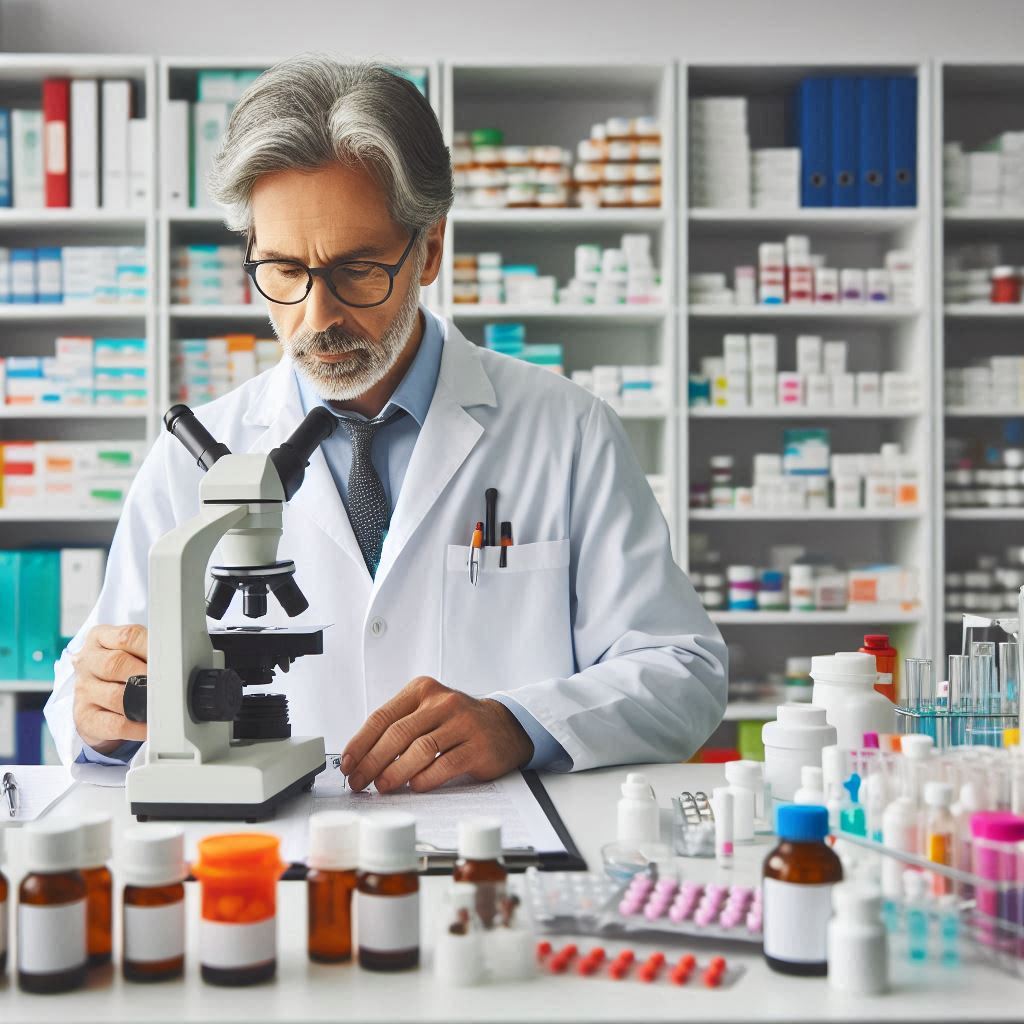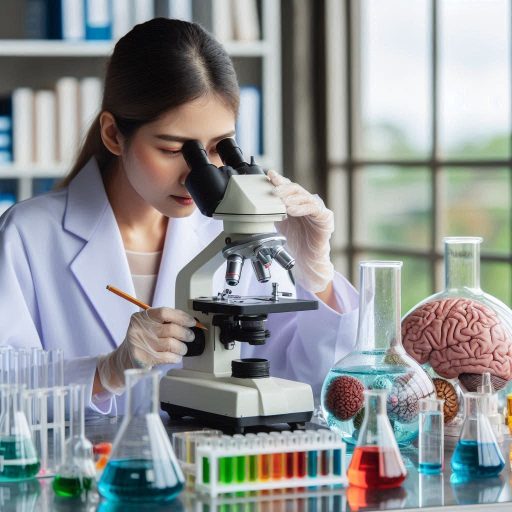Introduction
Pharmacologists are scientists who specialize in studying the interactions between drugs and biological systems.
They focus on understanding how drugs affect living organisms, including their mechanisms of action, therapeutic effects, and potential side effects.
In drug development, pharmacologists play a vital role in various stages, from initial research and testing to regulatory approval and post-market surveillance.
Their expertise is essential in pharmaceutical research, as they provide critical insights into drug safety and efficacy.
Pharmacologists conduct preclinical studies to assess a drug’s pharmacokinetics, which involves how the body absorbs, distributes, metabolizes, and excretes the drug.
They also evaluate the pharmacodynamics, which examines how the drug affects the body at the cellular and systemic levels.
This knowledge helps researchers identify the most promising candidates for further development, reducing the risk of failure in clinical trials.
The importance of pharmacologists in pharmaceutical research cannot be overstated.
Their work ensures that new drugs are safe, effective, and meet regulatory standards before they reach the market.
By bridging the gap between basic science and clinical application, pharmacologists contribute significantly to advancing medical knowledge and improving patient care.
Role of Pharmacologists in Drug Discovery
Pharmacologists play a crucial role in drug discovery.
Their work encompasses various critical tasks, including conducting research on potential drugs, identifying potential drug targets, and studying the effects of drugs on biological systems.
Conducting Research on Potential Drugs
Pharmacologists conduct in-depth research on potential drugs.
This research forms the backbone of effective medication development.
They analyze existing compounds and explore new ones for therapeutic use.
Their work identifies which substances can be transformed into safe and effective drugs.
In the early stages of drug discovery, pharmacologists conduct high-throughput screening.
This process tests thousands of compounds quickly to find those that show promise.
By identifying potential hits, they streamline the drug development process.
This efficiency saves time and resources, enabling quicker progression to clinical trials.
Identifying Potential Drug Targets
Identifying potential drug targets is another vital task for pharmacologists.
They investigate how diseases develop at the molecular level.
By understanding disease mechanisms, pharmacologists can pinpoint specific targets for drug action.
These targets may include proteins, genes, or pathways involved in disease progression.
Their insights guide the selection of appropriate compounds to study further.
Pharmacologists employ advanced technologies such as molecular modeling and structure-activity relationship analysis.
These methods help optimize the chemical structure of drug candidates.
Pharmacologists can predict how changes to a compound may affect its effectiveness and safety.
Studying the Effects of Drugs on Biological Systems
Studying the effects of drugs on biological systems is a fundamental responsibility.
Pharmacologists conduct experiments to observe how drugs interact with living organisms.
They assess how drugs affect cellular functions and entire biological systems.
These studies help researchers understand drug efficacy and safety.
The collaboration between pharmacologists and other scientists is essential.
They work alongside medicinal chemists, biologists, and clinical researchers.
This teamwork fosters a comprehensive approach to drug development.
Together, they ensure that new drugs are not only effective but also safe for human use.
Pharmacologists also contribute to the design of preclinical studies.
They establish protocols to evaluate the safety and efficacy of drug candidates.
Their expertise ensures that these studies meet regulatory requirements.
This step is critical before any drug can enter clinical trials.
In essence, pharmacologists play an indispensable role in drug discovery.
They conduct research on potential drugs, identify suitable drug targets, and study the effects of drugs on biological systems.
Through their contributions, pharmacologists help pave the way for innovative therapies.
Their work is essential for the advancement of medicine and improving patient outcomes.
Contribution of Pharmacologists in Preclinical Studies
Pharmacologists significantly contribute to preclinical studies, which are crucial for ensuring the safety and efficacy of potential drugs.
Their roles encompass conducting pharmacokinetic and pharmacodynamic studies, assessing the safety and efficacy of potential drugs
Collaborating with other scientists in the drug development process.
Conducting Pharmacokinetic and Pharmacodynamic Studies
Pharmacologists begin by conducting pharmacokinetic (PK) and pharmacodynamic (PD) studies.
Pharmacokinetics examines how the body absorbs, distributes, metabolizes, and excretes a drug.
Understanding these processes helps predict how a drug behaves in various biological systems.
Pharmacodynamics focuses on the drug‘s biological effects and mechanisms of action.
Pharmacologists study how a drug interacts with its target and its overall therapeutic effect.
These studies provide essential data for optimizing dosing regimens and improving therapeutic outcomes.
Assessing the Safety and Efficacy of Potential Drugs
Assessing the safety and efficacy of potential drugs is another vital responsibility.
Pharmacologists design and conduct a variety of tests to evaluate a drug‘s potential side effects and therapeutic benefits.
They use animal models to study how a drug performs in a living organism.
These studies help identify any adverse reactions and establish safe dosage ranges.
By thoroughly evaluating these factors, pharmacologists provide valuable information to inform clinical trial design.
Their assessments help ensure that only the safest and most effective drugs progress to human testing.
Collaborating with Other Scientists in the Drug Development Process
Collaboration is key in the drug development process, and pharmacologists often work closely with other scientists.
They partner with medicinal chemists to develop and optimize drug candidates.
By sharing insights on drug interactions, pharmacologists help chemists refine compounds for improved performance.
Pharmacologists also collaborate with toxicologists to assess potential risks associated with new drugs.
This teamwork fosters a comprehensive understanding of each drug’s profile, facilitating informed decision-making.
Additionally, pharmacologists engage with clinical researchers to prepare for clinical trials.
They help design study protocols and define endpoints based on preclinical findings.
This collaborative approach ensures a seamless transition from preclinical to clinical stages.
Pharmacologists play a crucial role in preclinical studies.
They conduct pharmacokinetic and pharmacodynamic studies to understand drug behavior.
Their work in assessing safety and efficacy is vital for identifying promising candidates.
By collaborating with other scientists, pharmacologists enhance the drug development process.
Their contributions lay the groundwork for successful clinical trials and ultimately benefit patient care.
Read: Preparing for a Botany PhD: Tips and Advice
Pharmacologists in Clinical Trials
Pharmacologists play an essential role in clinical trials, ensuring that new drugs are tested for safety and effectiveness in human subjects.
Their contributions include designing clinical trials, monitoring safety and efficacy, and analyzing data from these trials.
Designing Clinical Trials to Test the Effectiveness of Drugs
One of the primary responsibilities of pharmacologists is designing clinical trials.
They develop protocols that outline how the study will be conducted.
This includes determining the study population, inclusion and exclusion criteria, and dosing regimens.
Pharmacologists ensure that the trial design effectively tests the drug‘s efficacy while minimizing potential risks to participants.
They collaborate with clinical researchers to establish clear objectives and endpoints.
This careful planning is crucial for generating valid and reliable results.
Monitoring the Safety and Efficacy of Drugs in Human Subjects
Monitoring the safety and efficacy of drugs in human subjects is another critical function.
Pharmacologists oversee the trial process to ensure compliance with regulatory standards.
They assess adverse events and unexpected reactions during the study.
By monitoring these factors closely, pharmacologists help safeguard participant health.
They also evaluate how well the drug achieves its intended effects in real-world scenarios.
This ongoing assessment is vital for making informed decisions about the drug‘s development.
Pharmacologists also play a role in adjusting trial protocols as needed.
If safety concerns arise, they may recommend changes to the study design or dosing.
Their expertise ensures that clinical trials remain focused on participant welfare while gathering essential data.
Analyzing Data from Clinical Trials to Determine Drug Efficacy
Once clinical trials conclude, pharmacologists analyze the data to determine drug efficacy.
They use statistical methods to evaluate outcomes, comparing the drug‘s effects against a control group.
This analysis reveals whether the drug meets its primary endpoints.
Pharmacologists interpret the results, considering various factors such as demographics and baseline characteristics.
Their insights help determine the drug‘s overall effectiveness and safety profile.
Additionally, pharmacologists prepare reports summarizing the trial findings.
These reports are crucial for regulatory submissions and scientific publications.
They contribute to the body of knowledge in pharmacology and help inform future research.
Pharmacologists are integral to the success of clinical trials.
They design trials to rigorously test drug effectiveness, ensuring participant safety throughout the process.
By analyzing trial data, they determine the efficacy of new drugs, guiding decisions on their approval and use.
Their expertise is vital for advancing medical science and improving patient care.
Read: How Climate Change Is Impacting Plant Research

Pharmacologists in Drug Regulation
Pharmacologists play a pivotal role in drug regulation, ensuring that new medications are safe and effective for public use.
Their responsibilities include interpreting data for regulatory submission, collaborating with regulatory agencies, and providing expertise on drug safety and efficacy.
Interpreting Data for Regulatory Submission
One of the primary tasks of pharmacologists is interpreting data for regulatory submission.
They analyze the results from preclinical and clinical studies to ensure compliance with regulatory standards.
This analysis helps to summarize key findings on the drug’s safety and efficacy.
Pharmacologists compile comprehensive reports that detail study methodologies, results, and conclusions.
These reports are crucial for regulatory agencies to assess the drug’s potential benefits and risks.
Pharmacologists also ensure that data is presented clearly and transparently.
This clarity aids regulatory agencies in making informed decisions about drug approval.
By interpreting complex data effectively, pharmacologists enhance the likelihood of successful submissions.
Collaborating with Regulatory Agencies to Ensure Drug Approval
Collaboration with regulatory agencies is another essential aspect of a pharmacologist’s role.
They work closely with organizations such as the U.S.
Food and Drug Administration (FDA) and the European Medicines Agency (EMA).
Pharmacologists provide critical input during the drug approval process, helping agencies understand the nuances of the research data.
This collaboration often includes discussions about trial designs and regulatory requirements.
Pharmacologists offer insights into optimal study conditions and the relevance of findings.
Their expertise helps shape regulatory guidelines, ensuring they are grounded in scientific evidence.
Pharmacologists may also participate in advisory committee meetings.
Here, they present findings and address questions from regulatory reviewers.
Their ability to communicate complex scientific concepts clearly fosters trust and transparency in the approval process.
Providing Expertise on Drug Safety and Efficacy to Regulatory Bodies
Pharmacologists provide vital expertise on drug safety and efficacy to regulatory bodies.
They evaluate the long-term safety profiles of drugs based on extensive research data.
By analyzing adverse event reports and post-marketing surveillance data, pharmacologists help assess the real-world impact of medications.
They also contribute to the development of risk management strategies.
By identifying potential safety concerns, pharmacologists work with regulatory agencies to implement monitoring plans.
These strategies ensure ongoing evaluation of drug performance in the market.
Moreover, pharmacologists assist in establishing guidelines for safe drug use.
They contribute to the creation of labeling requirements that inform healthcare providers and patients about potential risks and benefits.
In summary, pharmacologists are integral to drug regulation.
They interpret data for regulatory submission, collaborate with agencies, and provide crucial expertise on drug safety and efficacy.
Their contributions ensure that new medications meet the highest standards before reaching the market.
By safeguarding public health, pharmacologists help enhance the overall effectiveness of the healthcare system.
Read: Exploring the Different Branches of Geology
Transform Your Career Today
Unlock a personalized career strategy that drives real results. Get tailored advice and a roadmap designed just for you.
Start NowFuture Trends in Pharmacology and Drug Development
The field of pharmacology and drug development is rapidly evolving, influenced by advances in technology, the rise of personalized medicine, and emerging areas of research.
These trends promise to reshape how drugs are discovered, developed, and delivered to patients.
Advances in Technology Impacting Drug Discovery
Advancements in technology are revolutionizing drug discovery processes.
High-throughput screening techniques allow researchers to test thousands of compounds quickly and efficiently.
Automated systems and robotics streamline this process, enhancing productivity.
Additionally, artificial intelligence (AI) and machine learning algorithms are transforming data analysis.
These technologies can predict drug interactions and optimize chemical structures based on large datasets.
Computational modeling also plays a crucial role in drug discovery.
It enables pharmacologists to simulate drug-receptor interactions, reducing the time needed for experimental validation.
These advances not only accelerate the discovery process but also lower development costs, making new therapies more accessible.
Personalized Medicine and Individualized Drug Therapy
Personalized medicine is an exciting trend shaping the future of pharmacology.
This approach tailors drug therapy to individual patients based on their genetic makeup, lifestyle, and environment.
Pharmacologists are increasingly incorporating pharmacogenomics into drug development.
This science examines how genes affect a person‘s response to drugs, allowing for more effective and safer therapies.
Individualized drug therapy ensures that patients receive the right drug at the right dose.
This targeted approach minimizes adverse effects and maximizes therapeutic efficacy.
As pharmacologists gain deeper insights into genetic factors, they can develop tailored treatments for various conditions, from cancer to chronic diseases.
Emerging Areas of Research in Pharmacology
Emerging areas of research in pharmacology hold great promise for future drug development.
One significant focus is the exploration of biologics, including monoclonal antibodies and gene therapies.
These innovative treatments offer new avenues for addressing complex diseases that traditional small-molecule drugs cannot effectively treat.
Additionally, the field is witnessing a surge in interest in microbiome research.
The gut microbiome plays a vital role in drug metabolism and efficacy.
Understanding these interactions can lead to more effective treatments that consider individual microbiome profiles.
Another area of exploration is the development of nanomedicine.
Nanoparticles can enhance drug delivery, allowing for targeted therapy that minimizes side effects.
This technology improves drug solubility and stability, making treatments more effective.
The future of pharmacology and drug development is bright.
Advances in technology are transforming drug discovery, enabling faster and more efficient processes.
Personalized medicine promises to create individualized drug therapies that enhance patient outcomes.
Emerging areas of research, such as biologics and microbiome studies, are opening new frontiers in treatment options.
Together, these trends will shape the next generation of pharmacology, leading to more effective and safer therapies for patients worldwide.
Read: Top Skills Needed for a Successful Geology Career
Learn More: Preparing for a Space Science Job Interview
Gain More Insights: Ethical Considerations in Biomedical Engineering
You Might Also Like: Career Transition: From Biology to Ecology
Challenges Faced by Pharmacologists in Drug Development
Pharmacologists encounter numerous challenges in drug development, which can hinder the progress of new therapies.
Key issues include drug resistance, ethical considerations, and the need to balance innovation with safety.
Drug Resistance and Development of New Treatments
One of the most significant challenges is drug resistance.
As pathogens evolve, they develop mechanisms to evade the effects of existing medications.
This resistance complicates the treatment of infectious diseases, such as HIV, tuberculosis, and malaria.
Pharmacologists must constantly research and develop new treatments that can overcome these resistant strains.
The development of novel drugs requires a deep understanding of the underlying mechanisms of resistance.
Pharmacologists investigate how pathogens adapt and identify potential targets for new therapies.
This ongoing battle against resistance necessitates innovative approaches, including combination therapies and the use of adjuvants to enhance drug effectiveness.
Ethical Considerations in Drug Research
Ethical considerations present another challenge in drug development.
Pharmacologists must navigate complex ethical issues related to human and animal testing.
Ensuring the welfare of research subjects is paramount.
Pharmacologists are responsible for adhering to strict ethical guidelines during clinical trials, including obtaining informed consent from participants.
Moreover, the pressure to expedite drug development can lead to ethical dilemmas.
Balancing the need for rapid innovation with the obligation to ensure participant safety is crucial.
Pharmacologists must carefully consider the implications of their research and make decisions that uphold ethical standards.
Additionally, issues related to access and affordability of new treatments must be addressed.
Pharmacologists and researchers face the challenge of ensuring that life-saving medications reach diverse populations, particularly in low-income regions.
Balancing Innovation with Safety in Drug Development
Striking a balance between innovation and safety is a constant challenge in drug development.
While pharmacologists aim to develop groundbreaking therapies, they must also prioritize patient safety.
New drugs can have unforeseen side effects that may not emerge until after they are on the market.
Pharmacologists must rigorously evaluate safety profiles through extensive preclinical and clinical testing.
Regulatory agencies play a vital role in this process, requiring pharmacologists to provide comprehensive safety data before drug approval.
However, the lengthy review process can delay the availability of potentially life-saving treatments.
Pharmacologists must navigate this complex landscape, advocating for timely approvals while maintaining high safety standards.
Moreover, emerging technologies, such as gene editing and biologics, present unique safety challenges.
Pharmacologists must conduct thorough risk assessments to identify potential adverse effects associated with these innovative therapies.
Pharmacologists face several challenges in drug development, including drug resistance, ethical considerations, and the need to balance innovation with safety.
Addressing these challenges requires ongoing research, collaboration, and a commitment to ethical practices.
By overcoming these obstacles, pharmacologists can contribute to the advancement of effective and safe therapies for patients worldwide.
Conclusion
Pharmacologists play a crucial role in drug development.
They study drug interactions, effects, and mechanisms to ensure safety and efficacy.
Their expertise guides researchers in creating effective treatments for various diseases, making them indispensable in the pharmaceutical industry.
Interdisciplinary collaboration is essential for successful drug development.
Pharmacologists work alongside chemists, biologists, and clinicians to enhance drug design and testing.
This teamwork fosters innovation and accelerates the development process, ensuring that new drugs meet regulatory standards and clinical needs.
Collaboration among diverse experts helps bridge gaps in knowledge, facilitating a holistic approach to drug discovery.
The contributions of pharmacologists significantly improve healthcare outcomes.
Their research leads to new therapies that address unmet medical needs, enhancing the quality of life for patients.
By understanding how drugs affect the body, pharmacologists ensure patients receive safe and effective treatments tailored to their conditions.
Their ongoing efforts shape the future of medicine and enhance patient care.
As the landscape of healthcare evolves, recognizing and supporting the work of pharmacologists is vital for advancing drug development and improving health globally.
Their dedication to science not only contributes to groundbreaking therapies but also plays a significant role in enhancing public health and well-being.
[E-Books for Sale]
The Big Book of 500 High-Paying Jobs in America: Unlock Your Earning Potential
$19.99 • 500 High-Paying Jobs • 330 pages
Explore 500 high-paying jobs in America and learn how to boost your career, earn more, and achieve success!
See All 500 High-Paying Jobs of this E-Book
1001 Professions Without a Degree: High-Paying American Jobs You Can Start Now
$19.99 • 1001 Professions Without a Degree • 174 pages
Discover 1001 high-paying jobs without a degree! Unlock career tips, skills, and success strategies for just $19.99!




